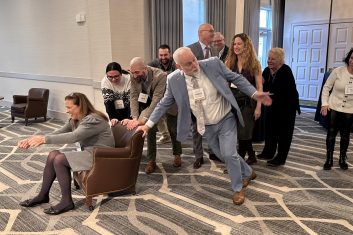CAI’s Pennsylvania Legislative Action Committee (PA LAC) has concluded a very busy, and successful, year on behalf of community associations throughout the Commonwealth. Pennsylvania’s two-year legislative session came to an end in October, and several pieces of legislation that impact community associations became law as a result.
PA LAC spent the better part of two years advocating for omnibus amendments to the Uniform Condominium Act (UCA), Real Estate Cooperative Act (RECA), and Uniform Planned Community Act (UPCA) embodied in House Bill 1499. The Bill passed the Senate unanimously on October 2, 2018 and the House unanimously on October 10, 2018. The Bill, now Act 84 of 2018, was signed by Governor Wolf on October 19, 2018, and becomes effective 60 days after being signed, on December 18.
Introduced on June 6, 2017 by Rep. Mark Keller (R-Cumberland/Perry), these amendments to the statutes governing common interest ownership communities in the Commonwealth are all intended to clarify existing provisions of the Acts and enhance the overall administration and governance of our community associations.
As proposed, these amendments relate to five (5) specific sections within each of the Acts and three (3) pertain just to the UPCA. Specifically, they address the powers of the association; the conveyance and encumbrance of common elements; the release of liens from real estate to be conveyed to the association; the declarant’s warranty against structural defects; the definition of, and disclosure requirements for, common facilities; and the contents of a recorded declaration. The amendments are designed to be entirely consistent with the statutory scheme already put in place by the Legislature and the consumer protection policies and purposes embodied in the Acts. The legislation updates provisions of the Acts to align with standards already being employed in Pennsylvania community associations, including fines for violations of community bylaws. The legislation is also aimed at making sure a unit owner board is elected within a reasonable amount of time, and that developers comply in handing over ownership of the community to the unit owners.
House Bill 2049, the Assistance and Service Animal Integrity Act, provides requirements for documentation for an assistance animal or service animal in housing and for the offenses of misrepresenting these animals. The legislation was introduced on February 2, 2018 by Rep. Dan Moul (R-Adams). The PA LAC worked very closely with legislators to ensure “associations” are included in the landlord definition in the legislation. This allows associations – condominiums, cooperatives, and planned communities – the right to request documentation of a homeowner’s need for a service or assistance animal when their disability is not apparent, and the association prohibits animals. The legislation was signed by Governor Wolf on October 24, 2018 and becomes effective 60 days after being signed, on December 23.
In addition to HB 1499 and 2049, PA LAC successfully negotiated amendments to significantly narrow the scope of HB 595, now Act 17 of 2018, related to the investigation of certain complaints in community associations by the state’s Office of Attorney General. In its original form, PA LAC had a number of objections to the bill. The LAC felt the bill was too broad, did not provide an association an avenue to resolve the complaint amicably with the unit owner and only provided remedies against the association and not the declarant. The amended Bill requires community associations established after the effective date of the new act to incorporate alternative dispute resolution procedures in their bylaws encouraging unit owners to attempt to resolve disputes among themselves or with the association. After CAI’s amendments were accepted, complaints may be filed in the event of a violation by either the declarant or the association of sections of the UCA, the UPCA or the RECA, related to meetings, quorums, voting, proxies and association records, thus significantly narrowing the scope of the legislation.
PA LAC works throughout the year to insure legislation does not have negative impacts on community associations in the Commonwealth and works to proactively pass legislation that is beneficial to the governance and management of community associations. Please consider a contribution from your community to assist with funding our advocacy efforts in Harrisburg on your behalf.





